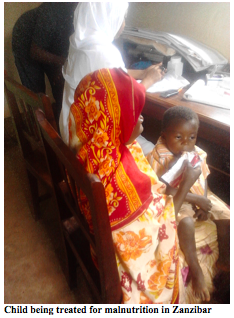Editor’s note: Marc Mitchell will be a distinguished participant in our webinar on May 23rd at 1pm EDT
Zanzibar, an island nation off the coast of Tanzania evokes images of cloves and cinnamon, white sandy beaches and fishermen in their Dhows, a boat that brought traders from the Arabian Peninsula to the East Coast of Africa. But it is also known for its high rates of childhood malnutrition. It is estimated that 12% of children on Zanzibar have acute malnutrition, among the highest in Tanzania.
Editor’s note: Marc Mitchell will be a distinguished participant in our webinar on May 23rd at 1pm EDT
Zanzibar, an island nation off the coast of Tanzania evokes images of cloves and cinnamon, white sandy beaches and fishermen in their Dhows, a boat that brought traders from the Arabian Peninsula to the East Coast of Africa. But it is also known for its high rates of childhood malnutrition. It is estimated that 12% of children on Zanzibar have acute malnutrition, among the highest in Tanzania.
Yet malnutrition is an entirely treatable disease. D-tree International, working closely with the government of Zanzibar, UNICEF, and the Innovation Working Group has developed an ambitious program to eliminate acute malnutrition as a public health problem in Zanzibar. The program uses a mobile phone based application that supports health workers to follow the Zanzibar guidelines for severe acute malnutrition exactly. The program was implemented in 2 sites in 2010-2011 and is now being scaled up to cover about 50 facilities throughout Zanzibar.
The software is an interactive application taking the health worker step by step through the guidelines using data
- Screening and Registration of each child with malnutrition
Then, for each visit of the enrolled child
- Screening for status (weighing, etc.)
- Appetite Test, as prescribed by the guidelines
- Physical Examination (e.g. to check for complications)
- Treatment (e.g. provision of correct amounts of RUTF)
- Counseling of the caregiver
- Setting next appointment date
The business model brings together the private sector, public sector and donor community to develop an integrated approach to the delivery of high quality child health interventions. The public sector funds all health workers and drugs needed for treatment of children as well as support of clinics in which children are treated. The private sector partner, Zantel (a subsidiary of Etisalat based in UAE) has agreed to support the scale-up of this project by:
- Equipping the nurses with the Android phones; providing data transfer for this project at free or reduced cost; providing high quality technical support services (encryption, network testing tools, etc.); providing awareness of the program in the community via a media campaign
The second private sector partner, Edesia will ensure adequate supplies of RUTF and assist with procurement and logistics. UNICEF has funded the pilot phase and has agreed to contribute funding to the scale up costs of this project from their overall funding to support malnutrition programs in Zanzibar. D-tree International will be the lead on this project and manage and evaluate the project overall.
[1] Robert E Black, Saul S Morris, Jennifer Bryce, Where and why are 10 million children dying every year? The Lancet, Volume 361, Issue 9376, Pages 2226 – 2234, 28 June 2003
__________________________________________________________________________________________
Marc Mitchell will be a distinguished participant in our webinar on mHealth this Wednesday, May 23rd at 1pm
To read other posts in this exclusive ongoing series, please visit the Mobile Health Around the Globe main page.
And if you have a Mobile Health Around the Globe story to tell, please email me at joan@socialmediatoday.com

